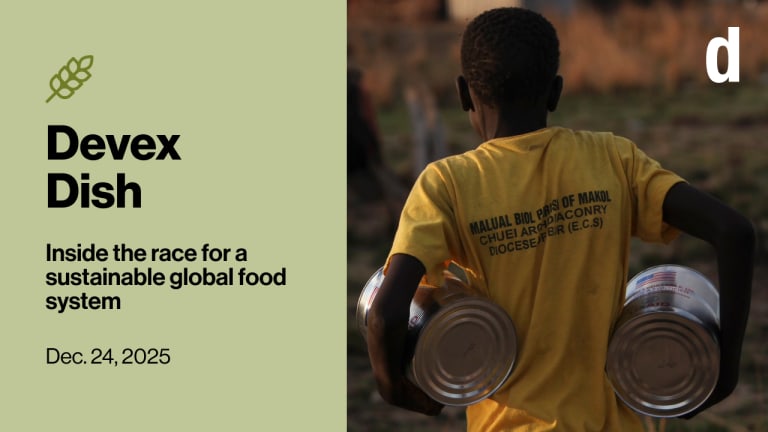
Nutrition for Growth, or N4G, is finally here, and parsing out commitments is as confusing as expected.
We’ve had our second virtual “moment” of the food systems year this week, with N4G streaming from Tokyo. Because the event couldn’t be held in person, we’re left with a series of recorded video statements from countries, U.N. agencies, and other multilaterals making announcements about how they will galvanize progress on nutrition outcomes.
On one hand, this ensures that more governments can participate because scheduling is flexible, and organizers wanted as many countries involved as possible. On the other, watching politician after politician reading from teleprompters hardly makes for compelling viewing. For journalists, it also makes coverage of these global events challenging: The time difference from Washington is 14 hours.
My London-based colleague Will Worley helped me out with coverage, and was struck by the lack of substantive pledges from the U.K. — even though they hosted the inaugural event in 2013. “They are actively rescinding their development status,” he tells me, and the advocacy community had some strong words of disappointment.
This is a preview of Devex Dish
Sign up to this newsletter to get the inside track on how agriculture, nutrition, sustainability, and more are intersecting to remake the global food system in this weekly newsletter.
The phrasing of many country announcements — intentionally, we’d have to posit — make it sound like new commitments are being made, but when you listen carefully, you hear phrases such as “we will continue to support,” followed by laundry lists of work that they are already doing.
This makes it hard to know what, if any, new funding is actually being announced. Canada announced Tuesday $195 million for 11 projects, but a press release noted that “a portion of this funding is part of the $520 million pledged by Canada at the launch of the Nutrition for Growth Year of Action a year ago.” Which portion? Has any of it already been spent? What remains?
The United States made a large commitment too, but one that comes with fine print: USAID will “invest up to $11 billion over three years, subject to Congressional appropriations.” The agency also announced efforts to expand large-scale food fortification — sounding incredibly similar to plans announced at September’s U.N. Food Systems Summit.
I'm writing you shortly after N4G concluded this morning, so stay tuned to Dish as we usher in the New Year by exploring what these commitments mean, and what nutrition leaders see as the way forward amid an extremely challenging landscape for hunger levels.
What was your impression of N4G? Will any of the announcements be game changing, or are we in for the status quo? Let me know your thoughts at dish@devex.com and we might share them with the community in a future issue.
Read: UK commits nothing at Nutrition for Growth Summit
ICYMI: Devex Pro subscribers can learn about how U.K. organizations fighting hunger are facing dire funding straits — leading to staff cuts.
A foundation for progress?
Governments weren’t the only ones making commitments this week. Foundations are also backing action to reverse rising malnutrition, with a “new catalytic entity” called Stronger Foundations for Nutrition announcing a collective $1 billion at an N4G side event. Contributors include The Rockefeller Foundation, the Bill & Melinda Gates Foundation, Eleanor Crook Foundation, and Children's Investment Fund Foundation.
A mouthful
“The children of Afghanistan … cannot be condemned to hunger and starvation just because of the lottery of geopolitics and the lottery of birth.”
— Mary-Ellen McGroarty, Afghanistan country director, WFPOver half the population of Afghanistan — about 23 million people — require “urgent” food assistance, according to WFP. Officials are expressing concerns about the severity of need ahead of winter, which is likely to exacerbate the emergency. More than 3 million children are at risk of severe hunger, with the price of bread soaring by 80%.
Last week, WFP’s executive director discussed the crisis in a meeting with Isobel Coleman, deputy administrator for policy and programming at the U.S. Agency for International Development. They also talked about the challenges surrounding the delivery of food assistance to Ethiopia.
Latin American hunger skyrockets
Bringing home the bacon: Job opening
Food Procurement Specialist
Central Texas Food Bank
United States
Last year, hunger in Latin America and the Caribbean saw the largest annual increase ever recorded, with food insecurity soaring by 30%. The region has been hit harder than any other in the world amid the pandemic, and a new report by five U.N. agencies found that the prevalence of hunger there reached 9.1% in 2020 — a 15-year high.
"The pandemic has had a devastating impact over the situation of food security and nutrition in our region,” said Julio Berdegué, FAO’s regional representative, during a launch event for the report. "But not everything is due to the pandemic."
Between the periods 2017 to 2019 and 2018 to 2020, the Northern Triangle showed the biggest increases in the prevalence of moderate or severe food insecurity. This echoes research I wrote about last month, which showed that people who are food insecure in El Salvador, Honduras, and Guatemala are more likely to make plans to migrate than those who have enough to eat.
Read: COVID-19 fuels the hunger crisis in Latin America and the Caribbean
In memoriam
Former U.S. Sen. Bob Dole, who was integral to expanding the country’s support for nutrition efforts around the world, died this week at age 98. The Republican worked with Democratic Sen. George McGovern to strengthen school feeding programs — efforts that eventually became the McGovern-Dole Food for Education Program, which currently feeds students in 30 nations. The two were awarded the World Food Prize in 2008, and Dole was a founding board member of WFP USA.
ICYMI: A report from the Global Child Nutrition Foundation found that more kids are fed when school meals are a national budget line item.
Number munching
49%
—That’s the percentage of Venezuelans regularly moving back and forth between their country and Colombia who report eating fewer than three meals per day. A recent survey of these “pendulares,” so called because their movements recall that of a pendulum, indicates that even with this cross-border movement, migrants are unable to meet basic needs such as a sufficient diet.
Chew on this
To avoid an “ashtray” aroma, wine made from grapes damaged by California wildfires is being turned into vodka instead. [Reuters
Although nutrition during adolescence impacts people’s health for the remainder of their lives, policymakers have not given it attention on par with early childhood nutrition. [The Lancet]
New York City Mayor-elect Eric Adams named members of a transition team for food policy — a first for the city. [POLITICO]









